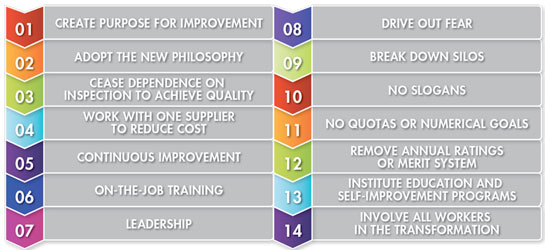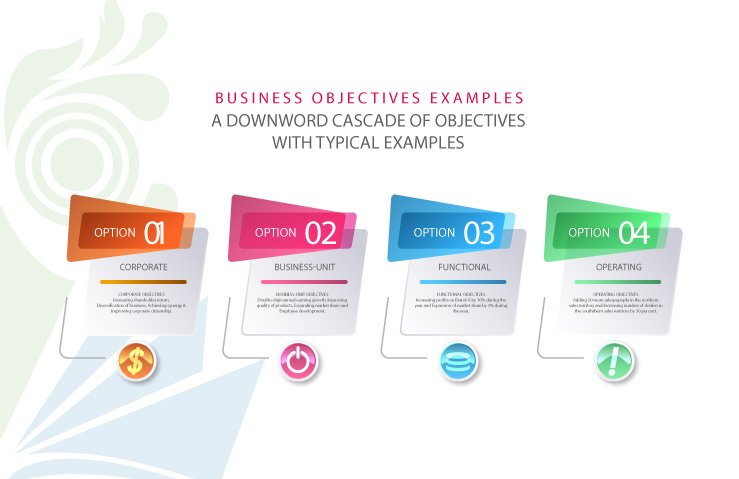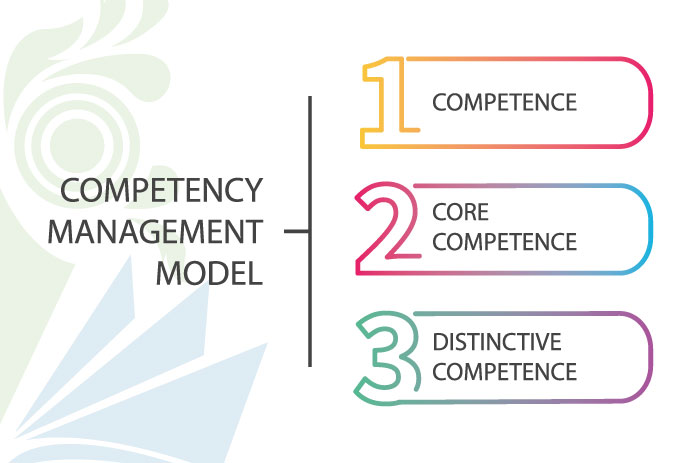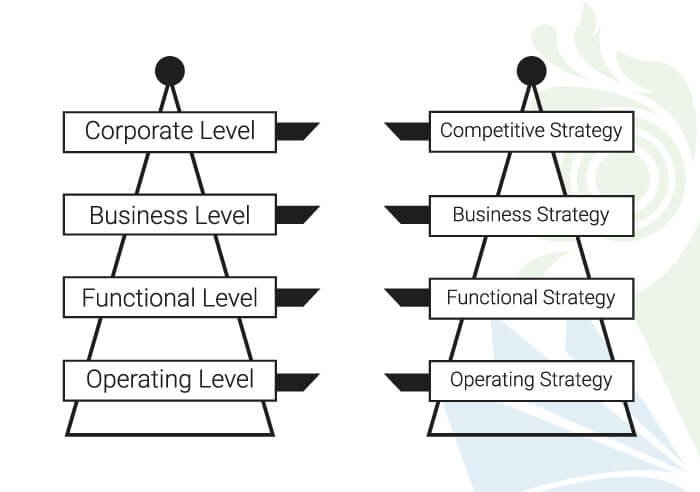14 Points of Deming – Total Quality Management (TQM)
Quality is a core idea of effective management, leadership, and programs like Total Quality Management (TQM) and Six Sigma. These programs accelerate a company to reach its goal or success. Similarly, 14 points of Deming is a sub-programs under TQM. It applies to any type and size of business. However, there are described the 14 points of Deming.
14 Points of Deming:
William Edwards Deming (W. Edwards Deming) was an American statistician, author, lecturer, college professor, and consultant, etc. He is also well-known for his work in the field of quality management. For transforming business effectiveness, 14 points of Deming are the key principles to managers. These key principles were first presented in his book Out of the Crisis. Although Deming does not use the title in his book, it ascribes with taking off the Total Quality Management movement. However, these 14 points of Deming are:-
- Create a constant purpose toward improvement
- Adopt the new philosophy
- Cease dependence on inspection to achieve quality
- Work with one supplier.
- Continuous improvement
- On-the-job training
- Leadership
- Drive out fear
- Break down silos
- No slogans
- No quotas or numerical goals
- Remove annual ratings or merits system.
- Institute of education and self-improvement programs
- Involve all workers in the transformation
There are shortly described below all 14 points of Deming so that each one can understand properly. After that, an individual enriches himself to implement in business strategy.

Read: Scientific Management Theory
1. Create a Constant Purpose toward Improvement:
Firstly, creating a constant purpose toward improvement is the most important key of the 14 points of Deming. A long-term plan is essential for quality. It resists reacting to the short-term solutions. So, strategic management should find better things to do instead of the same things. So, it requires to predict and prepare for future challenges and always have the goal of getting better.
2. Adobe the New Philosophy:
Secondly, adobe the new philosophy is one of the 14 points of Deming. It embraces quality throughout the organization. It puts the customers’ needs first, rather than react to competitive pressure. And design products & services to meet those needs. Additionally, It prepares for a major change in the way business is done. It’s about leading, not simply managing. And, Creates your quality vision and implements it.
3. Cease Dependence on Inspection to Achieve Quality:
Inspections are costly and unreliable. They don’t improve quality. They merely find a lack of quality. In the process, it builds quality from start to finish. It doesn’t just find what arose wrong or eliminate the “wrongs.” Therefore, it uses statistical control methods – not physical inspections alone – to prove that the process is working.
4. Work with One Supplier:
Quality relies on consistency. The less disparity you have in the contribution, the less disparity you’ll have in the result. In quality, look at suppliers as your partners. This principle of 14 points of Deming encourages them to spend time improving their own quality. They shouldn’t take part in your business based on charge alone. This point analyzes the total cost to you, not just the initial cost of the product. And uses quality statistics to ensure that suppliers meet your quality standards.
5. Continuous Improvement:
Continuously improving systems and processes must be absorbed. Deming promoted the PDCA (Plan, Do, Check, and Act) approach to process analysis and improvement. It emphasizes training and education so everyone can do their jobs better. Secondly, KAIZEN is another model to reduce waste and to improve safety, effectiveness, and productivity.
6. On Job Training:
On the job uses training for consistency to help reduce variation. It builds a foundation of common knowledge. Training allows workers to understand their roles in the “big picture.” It encourages staff to learn from one another. Using training on the job provides a culture and environment for effective teamwork.
7. Leadership:
Leadership is another key point of the 14 points of Deming. It expects your managers and supervisors to understand the processes and the workers they use. Leadership doesn’t simply supervise – provide support and resources so that each staff member can do his or her best. So, it runs a coach instead of a police officer. It figures out what each person actually needs to do his or her best. This key point emphasizes the importance of transformational leadership and participative management. Leadership finds ways to reach full potential and doesn’t just focus on meeting targets and quotas.
8. Drive out fear:
Each management should allow individuals to perform at their best by ensuring they’re not afraid to express ideas or concerns. Everyone knows that the goal is to achieve high quality by doing more things right. And, anybody does not interest in blaming people when mistakes happen. So, management should create such a situation to feel valued and encourage them to look for better ways to do things. And also ensures that your leaders are approachable and that they work with teams to act in the company’s best interests. For that reason, it uses open and honest communication to remove fear from the organization.
9. Break down Silos:
Break down barriers between departments is an important principle of the 14 points of Deming. By supporting this procedure, builds the “internal customer” concept – recognize that each department or function serves other departments that use their output. It uses cross-functional teamwork to build understanding and reduce adversarial relationships. So, it focuses on collaboration and consensus instead of compromise.
10. No Slogan:
Management should inform their people exactly what you want – don’t make them guess. “Service excellence” is memorable and short, but what does it mean? How is it achieved? The message is clearer in a slogan like, “You can do better if you try.” Management should create space for employees to use words and nice-sounding phrases to replace effective leadership. So, management must outline their own expectations and then praise people face-to-face for doing good work.
11. No Quotas or Numerical Goals:
We should look at how the process is carried out, not just numerical targets. The proponent of the 14 points of Deming said that creation targets inspire high output and low quality. And, also provides support and resources so that production levels and quality are high and achievable. So, management measures the process rather than the people behind the process.
12. Remove Annual Ratings or Merits System:
This principle of the 14 points of Deming motivates to remove the annual rating or merit system. It allows everyone to take pride in their work without being rated or compared. This key point treats workers the same and don’t make them compete with other workers for monetary or other rewards.
13. Institute of Education and Self-Improvement Programs:
Educational institutes and self-improvement programs improve the current skills of workers. This initiative encourages people to learn new skills to prepare for future changes and challenges. Additionally, it builds skills to make your staff easier to alter and better detect and attain improvements.
14. Involve all Workers in the Transformation:
Finally, the 14 points of Deming involve all workers in the transformation in the job environment. Thus, principles try to improve the overall organization by having each person take a step toward quality. And analyzes each small step and understand how it fits into the larger picture. Therefore, Deming suggested using effective change management principles to introduce the new philosophy and ideas in 14 points Deming.
In conclusion, 14 points of Deming is a radical effect on the business world. In other words, these principles are the accelerator of the implementation process of TQM.
Collect the Books
You can collect one or more books from the following list. From this book, your conception may be more enriched in this field.




Way cool! Some very valid points! I appreciate you writing this article plus the rest of the site is extremely good.
Good blog you have here.. It’s hard to find good quality writing like yours these days. I seriously appreciate people like you! Take care!!
You have made some good points there. I checked on the internet for additional information about the issue and found most people will go along with your views on this web site.
Really informative blog article. Much thanks again. Keep writing.
Hi, I am Kavin, it’s my first occasion to commenting anywhere when I read this article I thought I could also make comment due to this sensible post.
I’ve recently started a website, the information you offer on this website has helped me greatly. Thanks for all of your time & work.